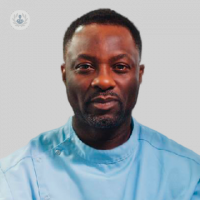Tooth restoration: An expert insight
Written in association with:Tooth restoration is the process of repairing or replacing a damaged or missing tooth, aiming to restore its function, aesthetics, and overall oral health. This can involve various procedures, such as fillings, crowns, bridges, or veneers, tailored to address specific dental issues.
Here, Dr Olurotimi Adesanya MBE, renowned dentist, offers his expert insight into tooth restoration.

What are the different types of tooth restoration procedures?
There are quite a number of tooth restoration procedures.
In general, tooth restoration can be divided into two types:
- Direct restoration: Either a silver amalgam filling or a composite white filling.
- Indirect restoration: Made outside in a lab and then brought into the dental practice to be fitted into the patient's mouth. For example, veneers, crowns, bridges, etc.
What are the benefits of tooth restoration?
In situations where the tooth has been damaged due to decay or dental caries, a restoration will replace the defect left in the tooth after the caries has been removed.
Tooth restoration can thus:
- Preserve the integrity of the tooth and protect it from damage to the nerve. This will reduce dental pain.
- Restore the function of the tooth. For example, mastication.
- Improve the appearance of the tooth. For example, options like veneers can help increase confidence and improve self-esteem.
What are the risks of tooth restoration?
There are several risks:
- The tooth can be damaged in the process of designing the tooth that will accommodate the restoration. If the tooth is still alive, the delivery of the restoration can lead to the exposure of the nerve in the tooth. This can cause dental pain and sensitivity.
- The restoration may not last, causing the whole tooth to break. This can require the extraction of the tooth.
What is the recovery process for tooth restoration?
The recovery process depends on the type of restoration you had.
If you had a direct restoration like a filling, you could recover within one or two hours, especially if you had a composite filling which sets immediately. You could recover even quicker than that, if the treatment was performed under sedation or local anaesthetic.
If you had a direct restoration like amalgam (a silver restoration), it can take up to 24 hours for the restoration to set. In this case, we advise patients not to use the part of the mouth where the restoration is placed.
If you had a bigger restoration like veneers or crowns, it can take 24 hours for the mouth to adjust to the new restoration. In some cases, with full mouth reconstructions, it can take up to two to three weeks to recover from the procedure.
What can I expect after a tooth restoration?
It depends on why you had the restoration and what type of restoration you had.
If you had a direct restoration like a filling, once the decay has been removed and the teeth has been filled with restorative material, you won’t feel any sensitivity or dental pain and the function of your teeth will be restored.
If you had veneers, the appearance and shape of your teeth will be more aesthetically pleasing and your self-esteem will likely increase as a result.
If you had implant-retained restorations, which are very useful in patients who have lost several teeth due to decay or accident, we can provide these new bridges or dentures retained on implants that restore oral function and improve self-esteem.
How can I care for my teeth after tooth restoration?
We expect you to have oral hygiene measures like brushing your teeth twice a day and using mouthwash to keep your gums healthy.
We also advise that you see a dental hygienist periodically during the year to check the integrity of the restoration, check your oral health, and give you advice on how to maintain your restoration. If tooth restorations aren’t maintained, they will fail in the future.
Caring for your teeth after a tooth restoration is not too dissimilar to caring for your teeth if you didn’t have a restoration. Oral hygiene measures are the same and we expect patients to uphold them.
If you require tooth restoration and you would like to discuss your concerns with an expert, don’t hesitate to request an appointment with Dr Olurotimi Adesanya MBE via his Top Doctors profile today.


